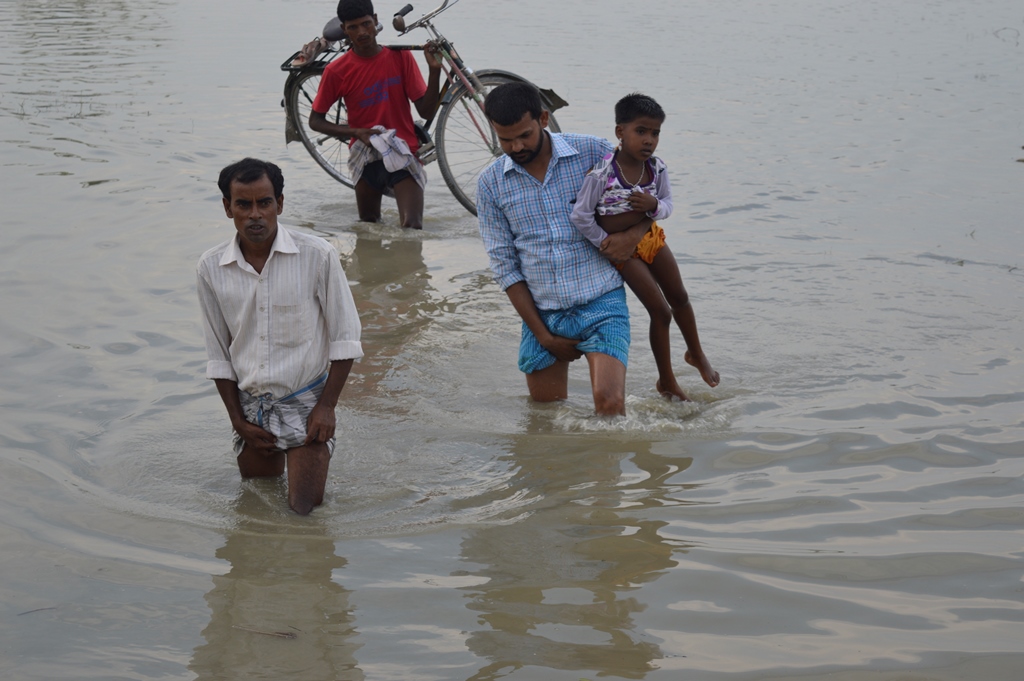Bihar Floods: No land to bury the dead; people staring at bleak future

By Raqib Hameed Naik, TwoCircles.net
Purnea/Kishanganj: For Jamaluddin Ahmed, 55, a resident of Surjapur village in Purnea district of Bihar, the recent floods that struck his village between August 11-13 have left a permanent scar on his life. Apart from losing everything he had purchased from his lifetime savings, Ahmed lost his wife Zulekha Begum to the floods.

The 45-year-old Zulekha was busy doing her household chores when she was swept away by the flood water. Although village residents were able to get hold of her, it was too late. She died, leaving behind her five daughters, four of them unmarried.
“The water was everywhere. There was no sign of life anywhere. People were crying for help. We put her dead body in a plastic sheet and kept it over the tin sheets covering the roof of our house,” said Ahmed.
The family was looking to bury the dead but they couldn’t as the flood water had covered every inch of the land surrounding the house. They waited for the water to recede, but it didn’t until the dead body started decomposing. Taking a hard decision, the family put a dead body into the flood water.
“For next three days, we waited for the water to recede. The dead body was giving out a foul smell. She couldn’t even get a proper funeral. Her daughters cry whenever they remember those moments,” says Haider Ali, 40, a relative of Zulekha.
[caption id="attachment_415550" align="aligncenter" width="1024"] Khalil Ahmed showing what remains behind of his collaposed house.[/caption]
Khalil Ahmed showing what remains behind of his collaposed house.[/caption]
Khadija Begum, 80, from Jairampur village in Purena district had left her home on August 11 to a safer location, when the water level in the nearby river started rising. Left to live alone after her husband died some fourteen years ago, Khadija used to live in a hut made up of Bamboo sticks, but that too was washed away in floods.
“When I saw water rising in the nearby river, I knew something bad was going to happen. I ran for safety. When I came back a few days ago, the devastation was almost given me a heart attack. I have nothing left now except few utensils,” she says while cooking fish, which had washed ashore with the flood water.
Khalil Ahmed, 65, from Mohiudinpur in Kishanganj district was not able to mutter a single word for days after witnessing the floods. He and his three sons are homeless after floods swept away their mud house not leaving a single trace behind as if the house never existed.
[caption id="attachment_415551" align="aligncenter" width="1024"] Khadija Begum inside a collapsed house cooking her lunch.[/caption]
Khadija Begum inside a collapsed house cooking her lunch.[/caption]
“Every year we used to have floods.This year also we thought, there will be such low-intensity floods, but this time it broke records of previous years. It was like Tsunami.,” he said.
“The house was my blood and sweat. I toiled hard as a labourer to build the house. I wish that we should have also died in the floods,” he added.
The family has taken refuge in a nearby school, anticipating and dreaming, the government help.
Almost every person in the 18 flood-affected districts of Bihar has a similar story to tell, as to how floods have brought ruin to them.
The flood water entered most of the villages in Bihar on the intervening night of August 11 and 12 as well as on August 13th, when the rivers swelled due to continuous rains. The affected districts are Purnea, Kishanganj, Katihar, Araria, Madhepura, Supaul, East Champaran, West Champaran, Darbhanga, Madhubani, Sitamarhi, Sheohar, Muzaffarpur, Gopalganj, Sahrasa & Khagaria. The death toll has risen to 300, affecting 13 million people across 18 districts in the state.
Importantly, North Bihar is one of India’s most flood-prone region, where recurring floods have brought devastation repeatedly. According to locals, the kind of the flood they witnessed now matched the unprecedented flooding of 1987.
The people, mostly in villages are yet to pick up whatever is left in the ruins to start their lives fresh as the food crisis are knocking their doors. In the backdrop of little or no food, with govt. assistance not reaching the rural areas, which remain cut off from the nearby towns, the majority of people are left at the mercy of the god.
“The government won’t come to help us. They will only give us a cheque, if we are in the dead list otherwise we won’t matter for them,” says Farooq a resident of village Jairampur in Purnea district.
“No one will come to help us. We have to gather bits and rebuild our lives again,” he asserts.
